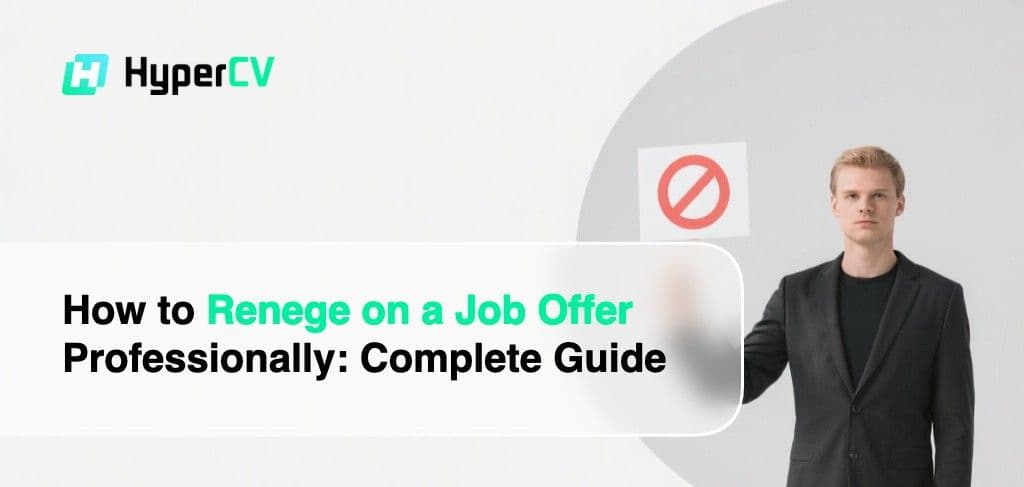How to Renege on a Job Offer Professionally: Complete Guide

Getting a job offer feels amazing, but what happens when things change? Maybe you got a much better offer, or you learned something about the company that makes you uncomfortable. Sometimes life throws curveballs that make it impossible to start a new job.
Whatever your reason, backing out of an accepted job offer happens more often than you might think. According to a 2019 Robert Half survey, 44% of candidates who renege on offers do so because they received a better opportunity. While it's never ideal, there are professional ways to handle this tricky situation. The key is knowing how to do it right so you don't damage your career or burn important bridges.
Let's explore the best ways to withdraw from a job offer while keeping your professional reputation intact.
Understanding What It Means to Back Out of an Accepted Offer
When you renege on a job offer professionally, you're withdrawing from a position you've already accepted. This is different from simply saying no to an offer you haven't agreed to yet. Once you've signed that offer letter, you've made a commitment that carries weight.
This decision isn't just about changing your mind. It can affect your professional relationships and even have legal consequences depending on your contract. Some companies invest significant time and money preparing for your arrival, so backing out can create real problems for them.
As noted by experts in the field, while reneging isn't uncommon, it should not be taken lightly due to potential professional and legal implications. That's why it's crucial to handle this situation carefully and make sure you're making the right choice for solid reasons.
When Is It Acceptable to Withdraw from an Accepted Position?
While reneging isn't something to take lightly, there are legitimate reasons that make it necessary. Career professionals note that in most cases, you can decline a job offer after you have accepted it. Here are some situations where backing out might be justified:
Better Career Opportunities
If you receive an offer that significantly advances your career goals or provides much better compensation, it might make sense to reconsider your current commitment.
Personal and Family Emergencies
Life doesn't follow our career plans. Health issues, family crises, or unexpected personal circumstances can make it impossible to start a new job.
Discovering Company Problems
Sometimes you learn troubling information after accepting. This could include financial instability, ethical concerns, or management issues that weren't apparent during interviews.
Logistical Barriers
Visa problems, relocation issues, or other practical challenges might make it impossible to fulfill your commitment.
The Real Consequences of Breaking Your Commitment
Before you decide to withdraw, it's important to understand what might happen. While most employment in the United States is "at-will," meaning either party can end the relationship, breaking commitments still has consequences.
Companies spend considerable resources on hiring. They've coordinated interviews, processed paperwork, and prepared for your onboarding. When you back out, it creates problems they'll need to solve quickly.
Potential Impacts on Your Career
| Consequence | Description | Long-term Effect |
|---|---|---|
| Damaged Relationships | Employers may feel misled or frustrated | Future networking opportunities may be limited |
| Industry Reputation | Word can spread in tight-knit professional circles | Other companies might hesitate to make offers |
| Legal Issues | Some contracts include penalties or notice requirements | Potential financial costs or legal complications |
| Blacklisting | Company may refuse to consider you for future roles | Permanent loss of opportunities with that employer |
As highlighted in professional guidance, neglecting to handle the situation professionally can lead to several negative consequences, including being blacklisted from that organization, a breakdown of professional relationships, and even legal issues.
In extreme cases, companies might even contact your new employer, which could put your alternative opportunity at risk. This is particularly important to consider in smaller industries where professional networks are tight-knit.
Step-by-Step Guide: How to Renege on a Job Offer Professionally
If you've decided you must withdraw, here's how to do it with class and professionalism. Based on expert recommendations, here are the essential steps:
1. Make the Decision Quickly
Once you know you won't be taking the job, don't delay. Every day you wait makes things worse for the company and shows less respect for their situation. Quick action demonstrates professionalism even in a difficult circumstance.
2. Start with a Phone Call
Don't handle this entirely through email. Pick up the phone first and have a real conversation with your hiring manager or HR contact. This personal touch shows respect and allows for immediate dialogue.
3. Follow Up in Writing
After your phone conversation, send a formal email confirming your decision. This creates a paper trail and gives you a chance to express your thoughts clearly and professionally.
4. Be Clear but Respectful
Don't beat around the bush or leave room for confusion. State your decision clearly while expressing genuine appreciation for the opportunity. Professional advisors emphasize that since they spent valuable time interviewing and creating a job offer that you accepted, the least you can do when reneging is express your gratitude.
5. Stand Firm in Your Decision
Once you've made this choice, stick with it. Don't waffle or seem uncertain. Employers respect decisiveness, even when they don't like the decision itself.
6. Offer Assistance Where Possible
While not always appropriate, you might offer to help ease the transition. This could mean recommending someone from your network or sharing insights that might help their continued search.
7. Never Disappear Without Notice
Ghosting an employer is the worst possible approach. Even if the conversation feels uncomfortable, maintaining professional communication protects your reputation and shows character.

Sample Communication Templates
Here's how your phone conversation might go:
"Hi [Hiring Manager's Name], this is [Your Name]. I'm calling about the [Position Title] offer I recently accepted. I need to inform you that due to unexpected circumstances, I won't be able to start in this role. I understand this creates challenges for your team, and I sincerely apologize for any inconvenience."
Follow up with an email like this:
*"Dear [Hiring Manager's Name],
Following our phone conversation today, I'm writing to formally confirm that I must withdraw my acceptance of the [Position Title] position at [Company Name].
I want to express my sincere appreciation for the opportunity and the time your team invested in the interview process. This was not an easy decision, and I understand the challenges my withdrawal may create.
Thank you again for your understanding, and I wish you and your team continued success.
Best regards, [Your Name]"*
For additional templates and examples, career experts provide detailed guidance on templates for turning down a job offer you agreed to and examples of how to rescind a job offer via email.
Preventing Future Situations
The best way to handle reneging is to avoid it altogether. Here are strategies to help you make better initial decisions:
Take Time Before Accepting
Don't feel pressured to accept immediately. Most employers understand that important decisions require thought. Ask for a reasonable amount of time to consider all aspects of the offer.
Ask Detailed Questions
Before accepting, get clear answers about company culture, growth opportunities, daily responsibilities, and management expectations. The more you know upfront, the better your decision will be.
Research Thoroughly
Look beyond the interview process. Check company reviews, financial reports, and industry news. Talk to current or former employees if possible to get honest perspectives.
Address Concerns Early
If compensation, benefits, or other terms concern you, negotiate before accepting rather than hoping things will improve later.
Manage Multiple Opportunities
If you're interviewing with several companies, be transparent about your timeline. This helps employers understand your situation and can prevent conflicts.
Special Considerations for Students and New Graduates
If you're a student or recent graduate, reneging can have broader implications. Universities often have strong relationships with employers, providing structured recruitment programs and internship opportunities.
As highlighted in professional resources, when students frequently back out of offers, companies may reduce their recruiting efforts at that school. This affects not just you, but future students who might lose access to opportunities.
Some career centers track job acceptances and may limit access to future services if students renege. Additionally, campus recruiters remember these situations, which could affect your chances with other companies they work with.
Before making this decision as a student, consider speaking with your career counselor about potential alternatives or ways to minimize impact.
Industry-Specific Considerations
Different industries have varying tolerance levels for reneging. In smaller, specialized fields like biotech, as discussed in industry forums, the industry is small and burning bridges is a significant concern. However, many professionals note that companies are not loyal and would likely drop an employee without hesitation, so any reasonable person would understand the situation.
The key is understanding your industry's culture and the potential long-term impact on your career within that specific field.
Moving Forward After Reneging
If you do withdraw from an accepted offer, treat it as a learning experience. Reflect on what led to this situation and how you can make better decisions in the future.
Consider these questions:
- Were there warning signs you missed during the interview process?
- Did you accept too quickly without proper consideration?
- Could better research have prevented this situation?
- What questions should you ask in future interviews?
Use these insights to improve your job search process and avoid similar situations in the future.
Final Thoughts
Learning how to renege on a job offer professionally isn't something anyone wants to do, but sometimes circumstances make it necessary. The key is handling the situation with integrity, respect, and clear communication.
While there will likely be some negative consequences, approaching the situation professionally can minimize long-term damage to your career. Remember that your reputation is built over time through many interactions, not just one difficult conversation.
If you find yourself in this position, take a deep breath, follow the steps outlined above, and handle it with the professionalism that will serve you well throughout your career. Sometimes difficult decisions are necessary for your personal and professional growth, and that's okay as long as you handle them with class and consideration for others.
For additional guidance on professional career transitions and avoiding common mistakes, consider consulting with career professionals who specialize in job search strategies and workplace negotiations.